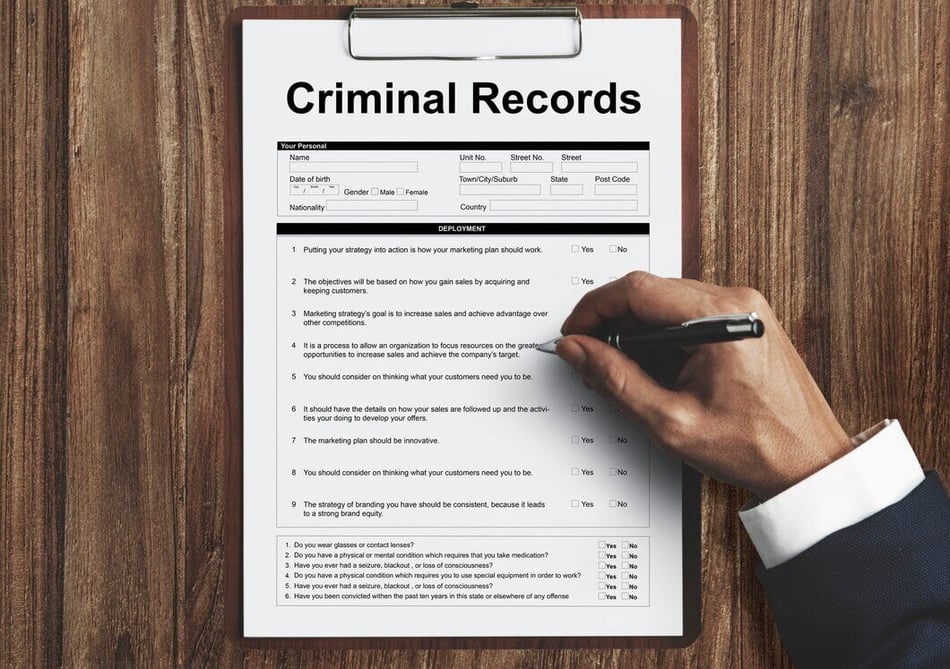
Having a criminal record can present significant challenges during immigration proceedings. It may stand in the way of obtaining a visa, green card, or naturalization. However, it is possible to take steps that can help mitigate these issues.
Clearing or addressing a criminal record is often crucial for those on an immigration journey. Read on as we share how you can handle these legal matters to ensure a smoother process.
Understanding the Impact of a Criminal Record on Immigration
A criminal record can greatly impact your immigration status and prospects. Immigration laws categorize crimes to determine how they affect a person's ability to enter or remain in the U.S. Some crimes, known as "crimes involving moral turpitude" or "aggravated felonies," carry severe consequences. These crimes can lead to deportation or inadmissibility, which prevents entering the country or adjusting status.
Even lesser offenses may affect your case, though their impact varies. Understanding your record’s influence involves knowing the type of conviction and how immigration law views it.
Some offenses might qualify for waivers, allowing for legal remedies, but this often requires legal assistance to navigate. Knowing whether your record requires addressing can help you take appropriate steps to avoid complications during immigration proceedings.
Another crucial factor is the timing of offenses. Recent crimes may draw increased scrutiny, influencing immigration officials' decisions during applications for visas or green cards.
Therefore, understanding your criminal record and its potential effects allows you to strategize and take action when necessary. Awareness of these impacts empowers you to navigate the immigration process more effectively, enabling you to focus on opportunities for legal relief or record clearance.
Researching Options for Record Clearance
Clearing your criminal record can significantly improve your chances in immigration cases. It is worth exploring available options to address the convictions impacting your status. Record clearance options vary and depend on state laws and the specifics of each case. Understanding these options is the first step in addressing your situation.
- Expungement: Often, expungement removes arrests and convictions from public records. This process can make it appear as if the conviction never happened, easing immigration processes. However, immigration authorities might still access the sealed records, influencing how thoroughly you must pursue this option.
- Sealing Records: Sealing often restricts access to criminal records from public view. This might be less extensive than expungement but still beneficial. It can limit the visibility of your past offenses and might improve how immigration officials view your case.
- Pardons: Receiving a pardon from a state governor or the president can also alleviate some issues. A pardon does not erase a conviction, but it acts as a legal forgiveness for the crime, which might benefit your immigration status.
Researching these avenues requires understanding specific legal procedures and potential eligibility. Consulting with legal experts to evaluate your record is invaluable in determining the best course of action, thereby making the immigration process smoother. It’s important to know that while these actions help, proactive steps maintain transparency and demonstrate a commitment to resolving past issues.
Steps to Expunge or Seal Criminal Records
To address a criminal record for immigration purposes, consider steps to expunge or seal your record. The process involves clearing your record of certain convictions, which can have positive effects on your immigration status.
First, check eligibility by reviewing the specific laws in the state of your conviction. Some states allow expungement or sealing for minor offenses, while others offer more limited options. Knowing your eligibility helps you set realistic expectations for what can be accomplished.
Once eligibility is confirmed, gather necessary documents such as court records, proof of sentence completion, and any other paperwork demonstrating rehabilitation. These documents will support your application for expungement or sealing.
Filing a petition with the court is the next step. You might need to complete forms or write a letter explaining why you believe your record should be expunged or sealed. Detail your rehabilitation efforts and how clearing your record would benefit your life.
Finally, attend a court hearing if required. Present a strong case for why the court should approve your request. Successfully clearing your record can make a significant difference in how immigration authorities view your application, improving your chances for a favorable outcome.
Preparing for the Immigration Process Post-Clearance
Once you've addressed your criminal record, prepare for the renewed immigration process. Clearing your record provides a fresh start, but preparation ensures you maximize your opportunities.
Begin by reviewing your immigration status and the specific requirements for your next steps, such as applying for a visa or adjusting your status. Determine what documentation is needed and gather updated records, including your expunged or sealed criminal records.
Next, seek legal advice to understand how your cleared record impacts your immigration case. An immigration attorney can offer insights into how the expungement or sealing might affect your standing and advise on additional measures to strengthen your case.
Prepare for interviews by knowing your background inside out. Practice common interview questions and present your story confidently. Highlight positive changes and steps you've taken since your previous record. This preparation shows your commitment to complying with legal and immigration standards.
Conclusion
Clearing your criminal record is a significant step in paving the way for better immigration prospects. The path involves understanding eligibility, gathering necessary documentation, and following legal procedures.
By doing so, you can lessen the impact of past convictions and present a stronger case for your immigration journey. Preparation and legal guidance are vital, as they ensure everything is in order for a fresh start with immigration authorities.
If you're ready to take control of your future by addressing your criminal record for immigration purposes, Novo Legal is here to assist. Our skilled criminal defense lawyers in Denver, CO, can guide you through each phase, ensuring you're well-prepared to proceed confidently. Contact us today, and let us help you clear the path to your immigration goals and celebrate new beginnings with you.



